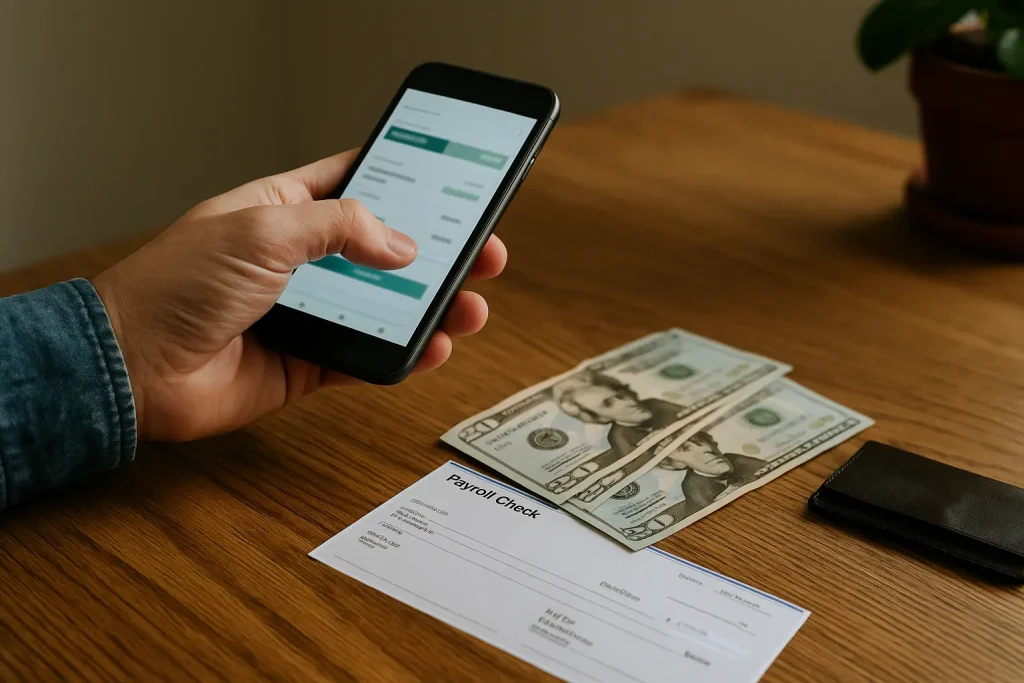Salary advance apps have gained popularity in the US as tools that allow workers to access part of their wages before payday. Promoted as a way to handle emergencies or unexpected expenses, these apps provide immediate liquidity without the bureaucracy of traditional loans. However, while they seem like a quick fix, they raise important questions about long-term financial health and hidden costs.
The growing use of salary advance apps reflects the reality of households struggling with rising costs of living. For many, waiting until payday is not feasible when facing medical bills, car repairs, or utility payments. But convenience comes at a price, and understanding the risks is essential to determine whether these apps are genuinely beneficial or just another form of debt.
How salary advance apps work?

The mechanics are straightforward. Employees request an advance through the app, which is usually limited to a percentage of their earned wages. The app transfers the money instantly, while the repayment is deducted automatically from the next paycheck. In many cases, the service is marketed as fee-free, but often includes transaction charges, subscription models, or optional tips that increase the real cost.
Another important aspect is that these advances are not traditional loans and therefore may not be reported to credit bureaus. This means they will not help users build credit history, but late repayment or overdrafts may still create financial strain. For this reason, salary advance apps should be evaluated carefully as part of a broader financial strategy rather than a permanent solution.
Pros and cons of salary advance apps
Before relying on salary advance apps, borrowers should take time to understand how they impact both immediate needs and long-term stability. On the positive side, they provide quick access to wages and are simple to use, which makes them appealing during emergencies. On the negative side, fees, lack of credit-building opportunities, and the risk of creating dependence are factors that cannot be ignored. A balanced view is essential to make informed decisions.
| Pros | Cons |
|---|---|
| Immediate access to earned wages | Hidden fees or subscription costs |
| Useful for emergencies and urgent expenses | Can create dependence on advances |
| No traditional credit check required | Does not build credit history |
| Simple, fast, and digital process | May lead to budget imbalances on payday |
When salary advance apps are most useful
These apps are designed for short-term relief and should not replace long-term financial planning. They are best applied in urgent scenarios, such as covering essential bills or unexpected expenses. The key is to use them strategically, while avoiding repeated reliance that could signal deeper financial issues. Some common situations where salary advance apps might help include:
- Paying overdue utility bills to avoid service cuts
- Covering small medical expenses before insurance reimbursement
- Handling urgent car repairs needed for commuting
- Managing unexpected childcare costs
Although helpful in these contexts, overuse can create a cycle where part of each paycheck is always committed to repayment. This reduces available income, making it harder to break free from dependency on advances. To avoid this trap, users must combine short-term solutions with better financial planning.
Strategies for responsible use
To maximize benefits, workers should view these apps as temporary tools, not ongoing financial resources. Setting clear limits, budgeting for repayment, and prioritizing emergency savings are essential practices. Exploring alternatives such as credit unions or employer-sponsored financial programs can also provide safer, more sustainable solutions.
Are salary advance apps worth it?
Salary advance apps can serve as a practical lifeline in emergencies, but they are not a substitute for stable financial management. Their speed and accessibility make them attractive, yet the risks of hidden fees and dependency must be carefully considered.
For workers committed to improving financial health, these apps should be used sparingly and strategically. When combined with budgeting and savings, salary advance apps can be a useful complement—but without caution, they risk turning into a financial trap.



